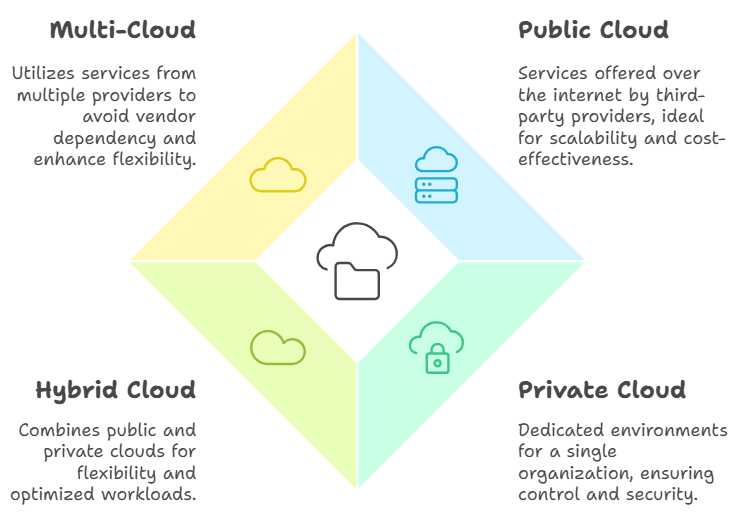Cloud computing has utterly modified how people and companies work together with expertise. It helps customers run complicated workflows on the cloud with out worrying about capability, safety considerations or administration.
As an example, for those who’ve tried to self-host an utility, you’ll’ve accomplished the next:
- Constructed an on-premise server.
- Managed the server room by offering complete cooling.
- Monitored the server assets and upgraded the server capability, such because the RAM and CPU, because the workload elevated.
This required a lot of effort, generally tougher than constructing the applying. Generally, managing your personal server is dear, as you need to purchase the server with sufficient RAM, and also you all the time have a limitation on vertically scaling a server. So, there’s a excessive likelihood you’d both over-provision or under-provision your server.
Nevertheless, the introduction of the cloud is easier, because the cloud vendor offers you with the assets to make use of on an on-demand foundation. You need to deal with constructing and deploying your utility whereas the cloud vendor takes care of your infrastructure.
So, let’s have a look at what’s cloud computing with examples and the advantages it provides to people and organizations.
Key Takeaways
- Cloud computing delivers IT companies over the web, together with storage, servers, databases, and software program.
- It offers scalability, value effectivity, and accessibility, making it a most well-liked selection for companies and people.
- Key gamers embrace AWS, Microsoft Azure, and Google Cloud, every providing distinctive companies and advantages.
- Rising developments like edge computing and AI integration are shaping the way forward for cloud expertise.
Understanding Cloud Computing
What Is Cloud Computing Providers?
For those who’re in search of what’s cloud computing in easy phrases, consider it as renting computing energy and storage on-line as an alternative of shopping for bodily servers.
If we go a bit deeper, cloud computing refers to delivering computing companies—comparable to servers, storage, databases, networking, software program, and analytics—over the web (“cloud”). This eliminates the necessity for companies and people to take care of bodily IT infrastructure, enabling entry to assets on demand with out worrying in regards to the underlying infrastructure.
For those who’re going forward with the cloud deployment, it is best to perceive that it has a set of key options that make it extraordinarily highly effective:
Scalability
Simply scale assets up or down based mostly on wants. Because of this you don’t must over-provision or under-provision your assets, however reasonably let the cloud determine when to scale your useful resource up and down based mostly on the workload.
Price-Effectivity
Pay just for what you employ, decreasing capital expenditure. You don’t must provision your assets considering you’re going to be serving 1000 customers. You can begin small, and develop when wanted.
Accessibility
Entry assets from wherever with an web connection. This implies you’ll be able to work seamlessly throughout totally different gadgets—whether or not it’s a laptop computer, pill, or smartphone.
Automation
Many processes, like updates and upkeep, are automated. Cloud distributors provide managed companies like Amazon EC2, AWS Lambda that deal with options like patch administration mechanically. You don’t want to fret about securing the underlying infrastructure as that’s taken care of by the seller.
Nevertheless, that you must be conscious in regards to the general utility safety. That is clearly outlined within the Shared Accountability Mannequin of the cloud. Whereas AWS takes care of securing the underlying infrastructure, that you must safe your utility.
Now, let’s see what are the several types of cloud techniques.
Sorts of Cloud Computing

There are 4 essential kinds of the cloud computing structure fashions that you may choose:
1. Public Cloud
Providers are supplied over the general public web by third-party suppliers like AWS and Google Cloud. Public clouds are perfect for companies that want scalability and cost-effectiveness. They supply a shared surroundings the place assets are managed by the supplier, making them extremely accessible and straightforward to deploy.
2. Personal Cloud
These are cloud environments which can be devoted to a single group. Personal clouds are tailor-made for companies requiring larger management and safety. They’re typically hosted on-premises or at a knowledge heart managed by a third-party supplier, making certain knowledge isolation and compliance with particular regulatory wants.
3. Hybrid Cloud
A hybrid cloud combines private and non-private clouds, providing flexibility and optimized workloads. A hybrid cloud setup permits organizations to run delicate workloads in a non-public surroundings whereas leveraging the general public cloud for much less vital duties. This ensures value effectivity whereas sustaining knowledge safety the place wanted.
4. Multi-Cloud
Makes use of companies from a number of cloud suppliers to keep away from dependency on a single vendor. Multi-cloud methods present redundancy, enhanced efficiency, and larger flexibility. Companies can choose one of the best companies from every supplier, tailoring their infrastructure to fulfill particular necessities with out being locked right into a single ecosystem.
Evaluating Main Cloud Suppliers
A number of cloud service suppliers have been highlighted underneath Gartner’s Magic Quadrant. Amazon Net Providers (AWS) is a cloud visionary and has been one for the previous 10 years. Nevertheless, there are a number of different cloud distributors which can be widely known, comparable to GCP, Oracle and Azure.
Nevertheless, AWS stands on high of the remaining because of its fixed innovation within the cloud and its large variety of cloud service fashions and choices.
Amazon Net Providers (AWS)
Amazon Net Providers (AWS) is a market chief in cloud computing, providing a broad vary of companies and a mature ecosystem. Its world presence ensures excessive availability and scalability, making it a superb selection for startups and huge enterprises. AWS offers superior instruments for machine studying, knowledge analytics, and IoT, catering to numerous enterprise wants. Firms searching for flexibility and cutting-edge capabilities typically select AWS for its sturdy efficiency and in depth service catalog.
Microsoft Azure
Microsoft Azure excels in seamless integration with Microsoft’s current merchandise, comparable to Home windows Server, SQL Server, and Workplace 365. Its enterprise-grade help makes it a most well-liked selection for organizations already entrenched within the Microsoft ecosystem. Azure’s hybrid cloud capabilities and deal with safety and compliance make it preferrred for industries like healthcare and finance. Companies leveraging Microsoft instruments can profit considerably from Azure’s streamlined operations and cost-effective options.
Google Cloud Platform (GCP)
Google Cloud Platform (GCP) stands out for its power in AI and machine studying. GCP’s TensorFlow and BigQuery are fashionable instruments for knowledge scientists and builders aiming to construct superior analytics options. Its cost-effective pricing construction and deal with sustainability enchantment to companies managing large-scale knowledge functions. GCP is a wonderful selection for data-intensive industries comparable to expertise, schooling, and analysis.
Different Suppliers
- IBM Cloud makes a speciality of enterprise-grade safety and AI capabilities. It’s typically chosen by companies in want of strong knowledge safety and superior AI companies, significantly in regulated industries like healthcare and banking.
- Oracle Cloud is famend for its sturdy database administration companies. Its cloud infrastructure is well-suited for enterprises counting on Oracle databases and enterprise functions. Oracle’s deal with efficiency and reliability makes it a best choice for vital enterprise workloads.
Managing Cloud Prices
So, for those who’re seeking to undertake any of those cloud distributors and begin using their cloud infrastructure companies now, it’s vital that you simply have a look at value. Irrespective of how good the cloud is, there are all the time methods you’ll be able to go fallacious and find yourself with a massively giant cloud invoice.
So, listed here are some methods to optimize cloud prices successfully:
Proper-Sizing Sources
Many organizations over-provision cloud storage and computing assets, resulting in pointless bills. Proper-sizing entails analyzing workloads and adjusting assets to match precise utilization. This ensures that you simply pay just for what you want, decreasing waste.
Utilization Monitoring
Recurrently monitor your cloud computing prices and utilization with instruments like AWS Price Explorer or Azure’s Price Administration and Billing. These instruments present insights into spending patterns, serving to establish areas the place prices could be decreased. For instance, recognizing underutilized digital machines can result in instant financial savings.
Reserved Cases
Cloud service suppliers provide vital reductions for committing to long-term utilization by means of reserved situations. By forecasting future wants and choosing these plans, companies can obtain value reductions of as much as 75% in comparison with on-demand pricing.
Avoiding Neglected Prices
Hidden bills, comparable to knowledge switch charges or idle assets, can inflate cloud payments. Implement automated alerts to detect unused storage or working situations. Moreover, set up insurance policies for managing your knowledge storage and transfers and archiving outdated knowledge to manage these prices successfully.
Common Audits and Opinions
Conduct periodic value audits to make sure alignment with enterprise objectives. These audits can uncover new alternatives for optimization, comparable to transitioning workloads to extra cost-efficient areas or leveraging different pricing fashions.
By adopting these methods, you’ll be able to maximize your cloud investments whereas minimizing pointless expenditures.
Concluding Ideas
And that’s just about on cloud computing.
In a nutshell, cloud computing is greater than a expertise; it’s a transformative method to leveraging IT assets. From cost-efficiency to scalability and innovation, the cloud has develop into indispensable for contemporary companies. By understanding what’s cloud computing definition, leveraging greatest practices, and staying up to date on rising developments, organizations can harness cloud computing advantages to their full potential to drive progress and innovation.
FAQs on Cloud Computing
What Is Cloud Expertise in Easy Phrases?
Cloud computing software program is a option to entry IT assets like storage and functions, in addition to distant servers over the web, with out proudly owning bodily {hardware}.
What Are Cloud Options?
Cloud options check with companies supplied by means of the cloud, comparable to SaaS (Software program as a Service), PaaS (Platform as a Service), and IaaS (Infrastructure as a Service).
What Is a Cloud Surroundings?
A cloud surroundings is a setup the place cloud assets function, together with each non-public and public clouds, non-public, hybrid, or multi-cloud fashions.
What Is Cloud Software program?
Cloud software program refers to functions and packages which can be hosted on cloud servers and accessed over the web. In contrast to conventional software program that requires set up on native gadgets, cloud software program operates solely on-line, permitting customers to entry it from any gadget with an web connection.
What Is Cloud Programming?
Cloud programming entails writing software program particularly designed to run on cloud platforms. Builders use instruments and languages like Python, Java, or Go to create scalable and environment friendly functions that leverage the cloud’s distributed structure.
What Is Meant by Cloud Computing?
Cloud computing refers back to the supply of computing companies comparable to servers, storage, databases, networking, software program, and analytics over the web.
What Are the Advantages of Cloud Computing?
Key advantages embrace flexibility, value financial savings, enhanced collaboration, and entry to superior instruments like AI and analytics.
With this understanding, companies and people can discover the world of utilizing cloud computing companies, making certain they continue to be aggressive and progressive in a quickly evolving digital panorama.
How Safe Is Cloud Computing?
Cloud computing provides sturdy safety measures comparable to encryption, firewalls, and entry controls. Nevertheless, safety duties are shared between the supplier and the consumer. Whereas the supplier secures the infrastructure, the consumer should safe their functions, knowledge, and entry.
What Are the Completely different Cloud Service Fashions?
The three main cloud service fashions are:
- SaaS (Software program as a Service): Entry software program over the web with out set up. Examples: Gmail, Dropbox.
- PaaS (Platform as a Service): Use cloud platforms to develop and deploy functions. Examples: Google App Engine, Microsoft Azure.
- IaaS (Infrastructure as a Service): Lease virtualized computing assets like servers and storage. Examples: AWS EC2, Google Compute Engine.
Can Cloud Computing Be Used Offline?
Typically, cloud computing requires an web connection. Nevertheless, some companies present offline entry options that synchronize knowledge as soon as the connection is restored.
What Is Serverless Computing?
Serverless computing permits you to run functions and companies with out managing underlying servers. The cloud supplier mechanically provisions assets as wanted. Examples embrace AWS Lambda and Azure Features.







